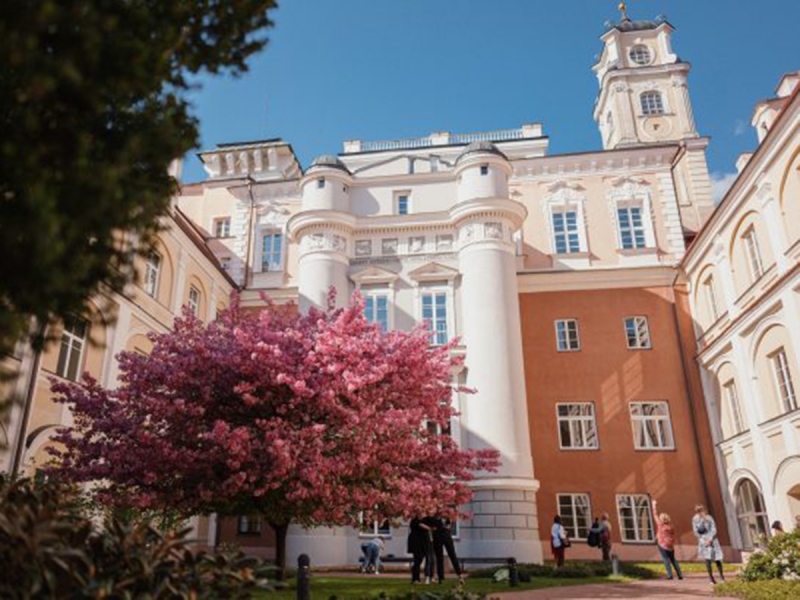Student Services
Student Services : https://www.vu.lt/en/studies/student-services

23 April 2025

23 April 2025

10 April 2025

27 March 2025

25 March 2025
Bachelor degree study programmes:
Information Systems and Cyber Security
Language and Artificial Intelligence Management
Master degree study programmes:
Student Services : https://www.vu.lt/en/studies/student-services
If you have to pay the tuition fee, you should go to E. Student application and follow instructions below:
E. Student-> Finances -> Tax Receipts -> Payment receipt-> Read notes below (for get the receipt)-> Click Get the receipt

Notes
Important: Please indicate in the payment order field the Payer: the student’s customer number (and the student’s full name and surname if the Payer is another person). The student’s customer number is indicated in a field called “Mokėtojo kodas”. Please note: that all bank charges must be covered by the payer.

Those students who need INVOICE for paying tuition fee could print out it themselves:
E. Student-> Finances -> Tax Receipts -> Invoice
Procedure of Payment, Reimbursement and Recovery of Tuition Fees at Vilnius University
*A student’s tuition fee may be adjusted in the event of taking less credits as compared to those indicated in the study plan, when studying under an individual study plan, upon failure to get the educational services established by the Agreement, in case of changing the study programme agreed upon transfer to a state-funded place and in other cases established by the council of the core academic unit.
An examination is the main method of assessment of learning outcomes. Certain subjects may be assessed as passed or failed. Examinations and pass/fail evaluations are carried out either in writing or orally and in writing.
Assessment of learning outcomes is carried out by the lecturer of the course unit or a commission of specialists of that field which also includes the lecturer of the course unit. A commission may be formed for the assessment of learning outcomes and in other cases under a written request submitted by students or unclassified students.
Academic debts and their elimination
A student can retake failed examinations (pass/fail evaluations) once no later than within the first two weeks of the new semester. If the examination period was extended for the student, the student must retake the failed examinations (pass/fail evaluations) within two weeks after the end of the extended period.
When a student fails an examination (pass/fail evaluation) during the retakings, the student must apply to the administration of the core academic unit (faculty) in order to repeat the course unit (module). To repeat a course unit, the student must submit an appropriate application before the semester or at the beginning of it. An established price is paid for repeating a course unit, calculated by multiplying 1/60 of the annual study programme price of the current year by the number of course unit credits.
Students who have debts and/or academic debts of more than 15 credits, as well as students who were not allowed to repeat the studies of these course units shall be expelled from the University.
Student rating and ranking
A rank is a number of students with the highest course unit (module) examination grades, formed in a descending order of the weighted average of learning outcomes. A rank is formed after each study semester according to the weighted average of the student's learning outcomes of the last semester at the University.
Weighted average of learning outcomes is the average of learning outcomes depending on the number of the studied course unit (module) credits and received grades; the grades of freely chosen course units are not considered when calculating the weighted average of learning outcomes.
Students are ranked:
Our mission
We seek to contribute to the world science by carrying out studies of Lithuanian and other languages, literature and culture research. We seek to educate philologists of wide erudition that are able to combine the development of most valuable traditions of humanities together with the openness to novelties as well as the ability to explore, change and create themselves, their lifes and the world around them.
About the Studies
The faculty provides opportunities both to deepen the knowledge of the native language, the languages of neighbouring and more remote countries, their literature, culture and to practice personal creative skills. Those interested in exact sciences also find their niche in the Faculty - they get involved in a number of experimental studies such as investigations of sounds, forms, words, etc.
What other benefits do you get by studying here?
If you choose to study at the Faculty of Philology, you will be able to: